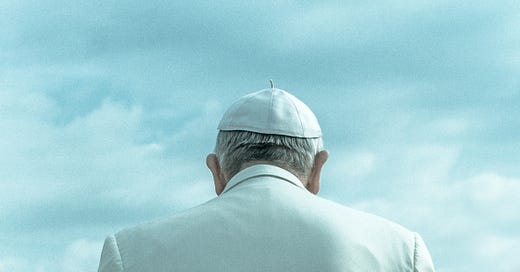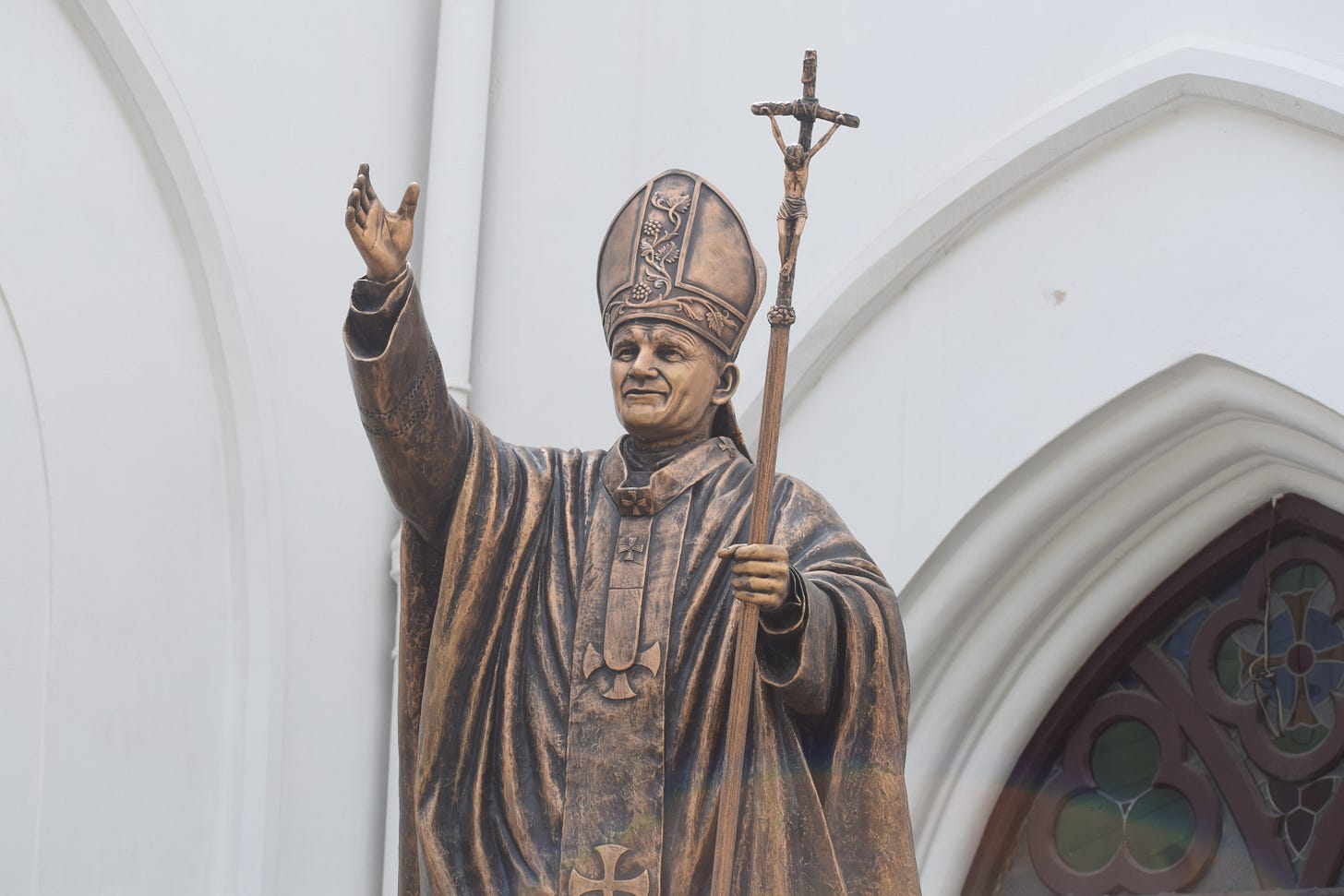Celebrating Pope Francis's Legacy in Iowa
The Francis at 10 Conference at St. Ambrose University
This past weekend I attended the Francis at 10 Conference hosted by St. Ambrose University in Davenport, Iowa, a celebration of the key themes and accomplishments of Pope Francis’s pontificate since his election in March, 2013. Similar events have been held around the United States, and Catholic media outlets have likewise published retrospectives on the major events and controversies of the pontificate. This conference stood out, however, for the caliber of the keynote speakers, including prelates, journalists, historians, and others with unique insights into Francis’s papacy.
The conference included two days of plenary and concurrent sessions on Friday and Saturday, as well as an opening reception on Thursday evening. I was only able to attend in person on Saturday, although I was able to “virtually” attend the plenary sessions on Friday. Three themes stood out to me as central to the conference’s presentations, and I think would serve as a good summary of Pope Francis’s legacy: missionary discipleship, synodality, and Francis’s social teaching.
Missionary Discipleship
On Friday, both Cardinal Joseph Tobin, the Archbishop of Newark, New Jersey, and the journalist Austen Ivereigh emphasized Pope Francis’s call for Christians to be “missionary disciples” (notably, this was also a significant theme at the Los Angeles Religious Education Congress at the end of February, which I wrote about here). Both described missionary discipleship as an approach to evangelization suited to the contemporary world characterized by pluralism, lack of trust in authorities and institutions, and social media. As Ivereigh noted, this new form of evangelization is less dependent on the Catholic Church holding an authoritative position in society, and instead is focused on creating the opportunities for people to encounter Jesus Christ.
Of course, the idea that the Church needs a new style of evangelization is nothing new. Pope John Paul II (1979-2005) had introduced the idea of a “New Evangelization” in his 1990 encyclical Redemptoris Missio (although he had used the phrase much earlier, and the phrase was also used by Pope Paul VI in his 1975 apostolic exhortation Evangelii Nuntiandi). For John Paul II, the New Evangelization primarily referred to efforts to “re-evangelize” those who had disaffiliated from the Church in traditionally Christian societies in Europe, North America, and Latin America (see, e.g., Redemptoris Missio, no. 33). His successor Pope Benedict XVI (2005-2013) interpreted the New Evangelization in much the same way, and established the Pontifical Council for Promoting the New Evangelization in 2010.
Significantly, both Tobin and Ivereigh in their talks referred back to the Fifth Episcopal Conference of Latin America and the Caribbean, which gathered in Aparecida, Brazil in 2007. The conference’s final document, known as the Aparecida Document and primarily drafted by the Archbishop of Buenos Aires Jorge Mario Bergoglio, the future Pope Francis, introduced the concept of “missionary discipleship” as a distinctive interpretation of the New Evangelization:
The history of humankind, which God never abandons, unfolds under his compassionate gaze. God has so loved our world that he has given us his Son. He proclaims the good news of the Kingdom to the poor and sinners. Hence, as disciples of Jesus and missionaries, we want to and must proclaim the Gospel, which is Christ himself. We announce to our peoples that God loves us, that his existence is not a threat to the human being, that he is near us with the saving and liberating power of his Kingdom, which accompanies us in tribulation, that he constantly sustains our hope in the midst of all trials. We Christians are bearers of good news for humankind, not prophets of doom.
The church must fulfill its mission by following the footsteps of Jesus and adopting his attitudes (cf. Mat 9:35-36). Though he was Lord, he made himself servant and obedient even to death on the cross (cf. Phil 2:8); though he was rich, he chose to be poor for us (cf. 2 Cor 8:9), showing us the path of our calling as disciples and missionaries. In the Gospel we learn the sublime lesson of being poor following Jesus, himself poor (cf. Lk 6:20; 9:58), and that of proclaiming the Gospel of peace with no purse or staff, placing our trust neither in money nor in the power of this world (cf. Lk 1:4 ff). God’s generosity is manifested in the generosity of missionaries; the gratuitous character of the gospel is shown in the gratuitousness of apostles. (nos. 30-31)
Missionary discipleship is founded on the encounter with Christ and is focused on the liberation and development of the whole human person. As the second paragraph suggests, this new style of evangelization requires the Church to abandon its privileges and attachment to wealth, a radical commitment in Latin America where the Catholic Church has long held a privileged position, but no less relevant in North America.
I think this emphasis on the Church’s need for reform may be Pope Francis’s most important contribution to understanding evangelization in the contemporary world. As Ivereigh noted, it is not enough for the Church to go out and proclaim the Gospel; it must continuously renew itself so that it reflects the Gospel in its structure and ministry. The Church, according to Francis, must avoid being “self-referential.” I think a good way to understand what he means by a “self-referential” Church is when the Church adopts an attitude that is the opposite of what St. Ignatius Loyola means by “indifference,” which I explained in an earlier post:
[W]e should be open to letting go of possessions, relationships, titles, status, and even our self-identity in pursuit of loving and serving God.
The Church has a tendency to want to maintain and hold on to the institutions, forms of ministry, and self-understanding of the past, and perhaps understandably so if they were at one time successful . But this grasping can keep the Church from being disposed to where the Spirit is calling today, and so the Church must be willing to let go and respond to the promptings of the Spirit. I think this call for renewal is behind Francis’s re-organization of the Curia last year and his emphasis on synodality, discussed below. The challenge, however, is that, while the Church must be open to renewal, there are also essential elements of the Church’s identity and practice, and the boundary between the two is not always clear.
Many of the conference sessions focused on how Pope Francis himself is an example of missionary discipleship through his leadership style. Kerry Robinson, a major figure in Catholic philanthropy and a partner of Leadership Roundtable, an organization focused on fostering effective, accountable, and mission-driven leadership in the Church, gave a keynote address on Saturday focused on the leadership style of Pope Francis as a model for Church leaders, both clerical and lay. She emphasized his authenticity, integrity, and humility as essential aspects of his leadership that have guided his reforms of the Church. She also highlighted Francis’s promotion of the laity and women into positions of leadership, crucial both as a matter of equity and for tapping into the full potential of the People of God.
In a concurrent session, Fr. Anthoni Jeorge, MI examined Pope Francis’s leadership style in terms of “servant leadership,” a term also used by Robinson. “Servant leadership” has become a well-known term in both popular treatments of leadership and the academic literature of leadership studies, and describes a leadership style focused on authenticity, self-sacrifice, and meeting the needs of others. Fr. Jeorge’s research provided a qualitative analysis of Francis’s leadership style, showing how it illustrates the qualities of servant leadership and how his example could be used to foster servant leadership.
Fr. Kevin Nadolski, OSFS, the Vice President for Mission at DeSales University, near Allentown, Pennsylvania, explored how Pope Francis’s teachings and leadership style can serve as a guide for Catholic organizations’ diversity, equity, and inclusion (DEI) efforts, with a particular focus on higher education. Fr. Nadolski focused especially on Pope Francis’s openness to differences and valuing the uniqueness and dignity of each person.
Over lunch on Friday, Joshua McElwee, the national editor for the National Catholic Reporter, recounted some of his travels with Pope Francis that illustrated his leadership style. Some illustrated Francis’s role as a peacemaker and a servant leader, such as his visit to Iraq in 2021. The episode that stood out to me was Francis’s handling of accusations of sexual abuse in the country of Chile, particularly against the priest Fr. Fernando Karadima, and their cover-up by the bishops. In 2015, Pope Francis had appointed Juan Barros to the episcopacy, despite accusations that he had known about and covered up Karadima’s abuse. Pope Francis at first dismissed these accusations as “calumny” lacking evidence. After a Vatican investigation confirmed the allegations, however, Francis apologized to abuse survivors and accepted Barros’s resignation. Although in one sense a failure of Francis’s episcopacy, both McElwee and Robinson pointed to his apology as remarkable.
Synodality
Synodality refers to the idea that all members of the Church should have a voice regarding the life of the Church, stemming from the Second Vatican Council’s teachings that the Church is first of all the People of God, and that each member of the Church is the recipient of a universal call to holiness. In 2020, Pope Francis announced a Synod on Synodality to begin in 2021, a worldwide process of assessing the participation of the faithful in the life of the Church and fostering greater listening and discernment in the Church. This launched what someone at the conference (I believe Austen Ivereigh) referred to as the largest listening session in world history, first at the parish and diocesan levels, and currently at the continental level.
Many of the sessions at the conference focused on synodality, a sign that it will likely be a lasting legacy of Francis’s papacy. Christine Way Skinner of the Toronto School of Theology, in a concurrent session, showed that the synodal process is bringing transparency and accountability to the Church, helping to make it a “healthier” organization. Synodality, therefore, reflects the leadership style touted by Robinson and is closely tied to Francis’s notion of missionary discipleship.
The theologian Phyllis Zagano argued in a keynote that the synodal process has highlighted the leadership role of women in the Church and pointed to the need for greater leadership by women. Zagano herself was a member of the Papal Commission
for the Study of the Diaconate of Women that met from 2016 to 2018, and the question of ordaining women to the diaconate was a frequent topic of conversation at the conference. A concurrent presentation by Casey Stanton and Ellie Hidalgo, co-directors of Discerning Deacons, focused on this issue and was praised by many of the attendees to whom I spoke.
In his keynote address, the church historian Massimo Faggioli noted that there are many misconceptions of the synodal process. For example, some believe that the process is simply a pretext for promoting a pre-determined agenda, rather than a true listening process. Others see the synodal gatherings as an opportunity to air out disputes over contentious issues, particularly regarding sexuality and sexual identity, abortion, and the leadership of women in the Church. Although these issues are part of the conversation, according to Faggioli, the synodal process is not so much focused on resolving disputed issues but rather on including the entire People of God in the discernment process of the Church. Faggioli proposed that focusing on the synodal process at the level of the local church, where people are more closely tied to one another and focused on more practical concerns of church life, can help overcome these misconceptions. As one conference participant privately told me, however, these misconceptions have also been an obstacle in local gatherings and can be encouraged by events such as the “Synodal Way” in Germany and disputes among American bishops.
Megan Effron, at the University of Notre Dame, offered a fascinating reflection on the vocation of a “synodal theologian,” a theologian who reflects the synodal reality of the Church. Effron proposes that theologians ought to be a bridge between the academy and the Church. More interestingly, just as synodality reflects the fact that the Church is the People of God on a journey together, Effron argues that theologians should see their collective work as “always in development,” open to the encounter with Christ and with others.
Francis’s Social Teaching
Pope Francis’s social teaching was also a significant focus at the conference, a testimony to its lasting influence in the life of the Church. At one of the plenary addresses, Anthony Annett pointed out that, although some have criticized Pope Francis for his criticisms of capitalism, Francis’s teachings on the economy are in continuity with his immediate predecessors John Paul II and Benedict XVI. Annett went on to outline some of the key themes in Catholic social teaching on the economy, particularly those that clash with the dominant neoliberal paradigm. These ideas are further developed in Annett’s book Cathonomics: How Catholic Tradition Can Create a More Just Economy.
In a concurrent session, Fr. Fidelis Olokunboro applied Francis’s economic teachings to the concrete realities in Africa, particularly Nigeria and the Democratic Republic of the Congo, while also drawing on the “theology of the people,” a branch of liberation theology that had a deep impact on Francis’s thinking. Stefan Gigacz traced the influence of Cardinal Joseph Cardijn, the originator of the influential See-Judge-Act method, on Pope Francis, both through earlier Catholic social teaching and the influence of the See-Judge-Act method on the work of the Latin American Bishops’ Conferences.
There were also several concurrent sessions on Pope Francis’s teachings on the environment and ecology, although this topic was hardly mentioned in the plenary. Some of these presentations focused on Francis’s call for an ecological spirituality, turning to the example of St. Francis of Assisi or exploring the links between ecological spirituality and Eucharistic theology. Others turned to practical ways the Church can promote care for the environment.
St. Ambrose University’s Francis at 10 Conference provided a robust accounting of Pope Francis’s legacy, focusing particularly on the themes of missionary discipleship, synodality, and Francis’s social teaching. The plenary speakers took a global perspective on Francis’s pontificate, looking at the “big picture.” Since the conference was in the United States, however, it would have been helpful if the conference organizers had given more attention to how Francis’s pontificate has been received by the diverse People of God in the United States, including Latino/a, Asian American, and African American Catholics. The conference was also largely celebratory, with little room for major criticisms of Francis. There is nothing wrong with that, and indeed future generations may look back on Francis’s pontificate as largely a success, along the lines raised at the conference. Those future generations, however, will also see that Francis faced opposition and criticism, and so the reasons for that criticism, whether justifiable or not, also need to be part of our account of his pontificate.
What are your own thoughts on Pope Francis’s legacy? Are there any events or actions that define his papacy for you? What has been your experience of the synodal process? Share your thoughts in the comments!
Of Interest…
Continuing a theme I raised last week, Kevin Appleby writes at America about how the Biden Administration’s immigration policy is departing from Catholic social teaching.
At Commonweal, Massimo Faggioli, one of the keynote speakers at the Francis at 10 Conference, writes on how differences in the reception of Vatican II in different regions of the world are impacting the synodal process.
At the National Catholic Reporter, Stephen Schneck calls on the U.S. bishops to re-write Faithful Citizenship, their guide for Catholic voters, in light of Pope Francis’s call for missionary discipleship. I made my own call for a revised Faithful Citizenship document right before the 2020 elections.
Jack Jenkins, writing for Religious News Service, explains how a number of states are proposing legislation that would require priests to break the seal of the confessional in cases of child abuse. A similar effort in Louisiana ultimately failed in 2016.
Coming Up…
I will publish the second half of my reflections on the hermeneutics of Vatican II, or rather, what happened before Vatican II, later this week (see here for the first half).
Stay tuned for some exciting things at Window Light in the next few weeks, including interviews with theologians and continuing commentary on the field of theology!







